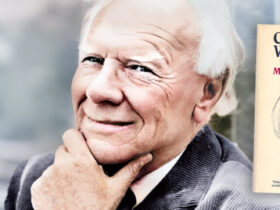Dawkins Versus God

Contemporary atheism has its own intellectual leaders. They fight against the Catholic Church, Christian values, and people who believe in God. One of them is Richard Dawkins.
Many atheistic books certainly have contributed to a loss of faith among poorly grounded Christians. On the other hand, the faith of thinking people, who know the teaching of the Catholic Church and deeply believe it, will certainly not be threatened by the embarrassingly low level of argumentation that can be found in such books as Richard Dawkins’ The God Delusion. However, truly well-formed Christians nowadays are relatively few. For this reason, Scott Hahn and Benjamin Wiker wrote the book Dismantling Dawkins’ Case Against God, in which they expose the logical and factual errors present in Dawkins’ The God Delusion.
The American philosopher, Alvin Plantinga, warns readers of The God Delusion that there is no “insightful and impartial commentary. However, the amount of insults, derision, mockery, unjustified anger, and venom is astonishing.” (The Dawkins Confusion: Naturalism ad absurdum, “Books & Culture”)
Powerful Faith in Happenstance
The atheist Dawkins believes strongly in the prevalence of mere happenstance (happening by chance). Dawkins attributes all of the most miraculous events simply to chance. According to him, “what is impossible – no matter how absurd – is possible. A moon that a cow could jump over could indeed – even for a few moments, thanks to a random collision of particles – be made of green cheese.” (Dismantling Dawkins’ Case Against God, p. 22)
Dawkins relies entirely on chance in order to be able to explain in purely materialist terms the phenomena, which for any normally thinking person, points to the existence of a supernatural cause. According to him, anything is possible with the exception of a miracle. For Dawkins, a miracle is possible, but it simply is not a miracle. Jesus’ Resurrection is possible, just as much as the accidental movement of molecules will make a marble figurine wave its hand and a cow jump over the moon.” (Dismantling Dawkins’ Case Against God, p. 27)
Dawkins claims that life on Earth started by chance; it started when something resembling DNA simply emerged spontaneously. He writes: “Even if the chance of spontaneous emergence of life on a planet is one billionth, still this shockingly improbable event could have happened even on a billion planets.” (The God Delusion, pp. 196-197)
There is an obvious logical fallacy in Dawkins’ argument because he assumed something he had yet to prove. First, he should prove that there is such a possibility, rather than assume it in advance.
The main problem is with the concept of the possibility and the impossibility, not with the lesser or greater probability. “If it is impossible to put up the perfect house of cards during a hurricane because the wind would blow the cards in all directions, then it will not be possible if we add a billion billions – or even a trillion – available planets to the calculation. If the spontaneous formation of DNA is simply impossible, it does not matter how many billions or even trillions of planets exist.” (Dismantling Dawkins’ Case Against God, p. 29)
Dawkins’ faith in the power of chance is stronger than many people’s faith in the existence of God.
Dawkins should first prove that the emergence of DNA by chance is possible, and then assess the chances of it happening. The complete denial of the existence of God led Dawkins to the absurd belief that anything is possible with the exception of a miracle.
“It is hard to imagine a more passionate faith in the power of chance than in someone who seriously considers the question of a marble statue waving its hand or a cow leaping over the moon.” (Dismantling Dawkins’ Case Against God, p. 31)
If there really is something that is impossible, such as the resurrection of Christ, we call this fact a miracle, or an event that is the work of God. Dawkins, on the other hand, assumes that God does not exist, therefore he wants to make his faith in the non-existence of God credible by believing that everything can happen by chance. Thus, chance – in Dawkins’ reasoning – replaces God the Creator, and thus rises to the rank of a deity that can do anything. And mere coincidence is a complete lack of intelligence, conscious choice, and causative power.
The Emergence of Life
Scientific data shows that the entire universe had to have been incredibly finely tuned in order that the conditions for life on our planet could emerge. Physicist Michael Turner states: “This precision can be compared to throwing a dart across the universe and hitting a bullseye of one millimeter in diameter exactly on the other side.” (Dismantling Dawkins’ Case Against God, p. 48)
On the other hand, physicist Fred Hoyle states: “A common sense interpretation of facts suggests that some superior intellect was toying with physics as well as chemistry and biology, and that in nature there are no blind forces worth mentioning.” (Dismantling Dawkins’ Case Against God, p. 47)
Defending his atheistic “belief” in the accidental emergence of life, Dawkins writes: “Regardless of the level of improbability of the birth of life, such an event must have happened on earth, because it is proved by our presence here.” Such an argument discredits Dawkins because he presupposes the existence of something that should first be proved.
The astonishing harmony, extraordinary precision, and current state of the entire universe, as well as the miracle of life, testify to the existence of the absolute intelligence of God the Creator, and not to some chance, accident, or luck.
“The universe is so perfectly attuned that the probability that it happened by chance is astronomically small … as observers who perceive the ‘perfect attunement’ of stone, wood, glass, and all the space in a cathedral, we could calculate the probability that this happened by chance, but such a calculation would serve only to underline how perfectly the cathedral was constructed or ‘tuned’, and not to confirm that its creation may in fact be a coincidence.” (Dismantling Dawkins’ Case Against God, p. 49) Dawkins avoids such reasoning and claims the opposite – that it is chance that is the ultimate cause of the emergence of the entire universe and of life on Earth.
This is an absurd statement because even the simplest cell of a living organism is infinitely more complex than a car! Even if all the parts of a car were gathered in one room, they would not make a functioning car by themselves. There has to be an intelligent man who puts them all together.
In order for the first living cell to emerge, it’s extremely complex parts would have had to exist earlier – so the question arises as to where and how they could emerge? Cell parts, like car parts, are built with the whole in mind, so there must be an intelligence that planned it all and carried out the design. For obvious reasons, coincidence cannot be the efficient cause of a car, let alone of a complex living cell.
Everything that is alive is made up of cells, and each of them functions like a miniature city. The human body is made up of trillions of cells that work as one organism. This fact is astonishing for every thinking person, because it shows the perfect wisdom and greatness of God the Creator.
Human life begins with a single cell the size of the full stop found at the end this sentence. This cell contains information (the DNA code) that makes it possible to create a body of 100 trillion cells of numerous different types, each with an extremely complex mechanism of chemical functioning. Logic points to the fact that it was God the Creator who encoded this information – a kind of ‘operations manual’ in each cell. Thanks to this, the whole organism, which is made up of 100 trillion cells, develops harmoniously and – thanks to the DNA code – each of them “knows” how it should function. This code contains very precise information. It is very naïve of Dawkins to claim that the DNA code and life emerged spontaneously from matter over millions of years of mutation and natural selection. Since the DNA code contains creative information, this points to its origin from God the Creator, who is the highest intelligence.
It is common sense that tells us that it is impossible for life to emerge by chance. Believing that life started by chance is as absurd as Dawkins’ belief that a million monkeys in a million years, accidentally hitting a million typewriters, will write all of Shakespeare’s works.
“So they (i.e. the skeptics) are Without Excuse” (Romans 1:20)
Every person can, by the effort of his own mind, discover the truth about the existence of God.
This is the official teaching of the Catholic Church. In the Second Vatican Council’s constitution Dei Verbum we read: “God, the beginning and end of all things, can be known with certainty from created reality by the light of human reason.” (DV 1, 6) In his Epistle to the Romans, St. Paul states that every man can know the truth about the existence of God by observing the harmony and beauty of creation: “For what can be known about God is plain to them, because God has shown it to them. Ever since the creation of the world his eternal power and divine nature, invisible though they are, have been understood and seen through the things he has made. So they are without excuse.” (Romans 1:19-20)
The almighty, invisible God makes himself known to every human being by revealing his existence “through his works”. Therefore, St. Paul states that people who do not believe in the existence of God, despite the fact that He revealed himself to them in the beauty and harmony of all creation, cannot be excused. When sins are committed consciously and willfully they so obscure the mind of man that they become the main reason for bringing into question God’s existence. People who are engrossed in sin “by their wickedness suppress the truth.” (Romans 1:18) “If human beings, with their intelligence, fail to recognize God as Creator of all, it is not because they lack the means to do so, but because their free will and their sinfulness place an impediment in the way,” explains St. John Paul II. (Fides et ratio, 19)
In the Book of Wisdom, God addresses very strong words to us: “For all people who were ignorant of God were foolish by nature; and they were unable from the good things that are seen to know the one who exists, nor did they recognize the artisan while paying heed to his works; but they supposed that either fire or wind or swift air, or the circle of the stars, or turbulent water, or the luminaries of heaven were the gods that rule the world. If through delight in the beauty of these things people assumed them to be gods, let them know how much better than these is their Lord, for the author of beauty created them. And if people were amazed at their power and working, let them perceive from them how much more powerful is the one who formed them. For from the greatness and beauty of created things comes a corresponding perception of their Creator. Yet these people are little to be blamed, for perhaps they go astray while seeking God and desiring to find him. For while they live among his works, they keep searching, and they trust in what they see, because the things that are seen are beautiful. Yet again, not even they are to be excused; for if they had the power to know so much that they could investigate the world, how did they fail to find sooner the Lord of these things?” (Wisdom 13: 1-9)
Cardinal Karol Wojtyła commented on this text at a conference, which was delivered during a retreat at the Vatican: “So when the author of the Book of Wisdom says, ‘For all people who were ignorant of God were foolish,’ he may think this way or he may even certainly think so from the standpoint of discernment, which is wisdom and not just knowledge. Wisdom seeks ultimate reasons, says the philosopher, who finds wisdom in metaphysics, which is precisely his field of knowledge. The Psalmist, on the other hand, will sing: ‘The fear of the Lord is the beginning of wisdom.’ (Psalm 111:10) Later the apostle will write: ‘Knowledge puffs up.’ (1 Corinthians 8:1) And these are different elements of the same matter, which, apparently, is not only of an intellectual nature, but also of a moral nature.” (The Sign of Contradiction)
In the encyclical Fides et ratio, in turn, St. John Paul II clarifies: “For the Bible, in this foolishness there lies a threat to life. The fool thinks that he knows many things, but really he is incapable of fixing his gaze on the things that truly matter. Therefore, he can neither order his mind (Proverbs 1:7) nor assume a correct attitude to himself or to the world around him. And so when he claims that ‘God does not exist’ (Psalm 14:1), he shows with absolute clarity just how deficient his knowledge is and just how far he is from the full truth of things, their origin and their destiny.” (Fides et ratio, 18)
The invisible God, the Creator of the entire Universe, through His selfless love invites all people to live in communion with Him. Every man should respond to this invitation with love, through faith, that is, by completely surrendering his reason and will to God.
“Beyond the path of philosophical knowledge, there is the path of faith,” writes St. Edith Stein. “It gives us an incredibly special closeness to a loving and merciful God and bestows certainty, such as no natural knowledge can give us. However, it should be remembered that the path of faith is also an obscure path. God adjusts his words to the measure of man so that we may comprehend the Incomprehensible.”
Source: Scott Hahn, Benjamin Wiker, Answering the New Atheism: Dismantling Dawkins’ Case






